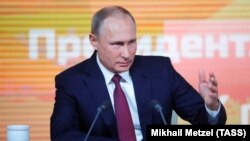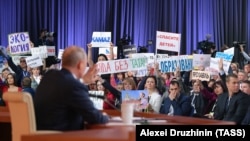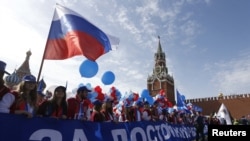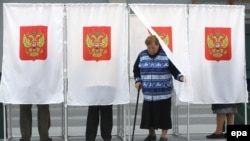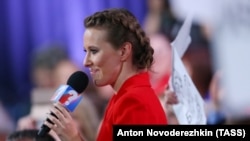At his annual year-end press conference, Russian President Vladimir Putin explained to reporters why he has not had any competitive rivals for the presidency in nearly twenty years.
“Of course, I would be happy if we had a balanced political system,” Putin said. “I want this, and I will work towards this. And a balanced political system is unthinkable without competition.” Putin went on to talk in statistical details about Russia’s economic and demographic achievements over the past 17 years since he first won the presidency in 2000.
While it is true that Russian living standards dramatically improved in last decade, driven mainly by high commodity prices, and Putin can claim credit for backing sensible economic policies such as tax reform, which increased state revenues, according to recent analysis by the World Bank, Russia’s economy is far from stable and a high share of the population remains vulnerable.
Russia has been facing a significant rollback in living standards in recent years. GDP growth has been hit hard. Since 2014, the country has experienced an increase in the number of citizens living in poverty, with nearly 20 million people living on less than $139 a month. Many of Russia’s regions are struggling under the weight of their debts.
While Putin speaks of a “balanced political system,” the Russian president’s rule has been characterized by a consolidation of power, Freedom House labeling Putin’s government as “authoritarian.”
“With loyalist security forces, a subservient judiciary, and a legislature dominated by his United Russia party, Putin is able to manipulate elections and inhibit formal opposition,” said Freedom House in it’s 2017 profile of Russia.
Analysts identify in Russia two types of opposition, often called systemic and non-systemic. The former refers to Russia’s formally registered opposition parties such as the Liberal Democratic Party of Russia (LDPR) and the Communist Party of the Russian Federation (KPRF). Non-systemic opposition refers to challengers such as the anti-corruption activist Alexei Navalny, and the late politician Boris Nemtsov, assassinated in Moscow in February of 2015.
While systemic opposition candidates have run against Vladimir Putin in elections, their parties typically do not oppose the president’s initiatives in Parliament. In one instance, LDPR presidential candidate Vladimir Zhirinovsky called elections in Russia “worthless,” and suggested that Putin should be given the title “supreme commander”
Non-systemic opposition candidates and activists are typically hampered by extremely complicated and ever-changing election rules, lack of state media coverage , state-media run smear campaigns and attacks by pro-government individuals. Allegations of election fraud are also common in Russia.
In one remarkable moment in Putin’s four hour press conference, an opposition candidate for president rose to question him. Ksenia Sobchak, the daughter of a Putin political mentor, was a TV reality host and is now a reporter for TV Rain.
“The problem is that today opposition candidates are not allowed to take part in elections, or they run into problems. I can feel it myself,” she told the president.
Describing why she thinks the political competition is absent in Russia, Sobchak said: “All of it is simply connected with fear. People understand that to be an opposition member in Russia means that you will either get killed, or go to jail.”
Putin dismissed Sobchak and other opposition candidates, saying they do not offer positive solutions for Russia’s problems.




